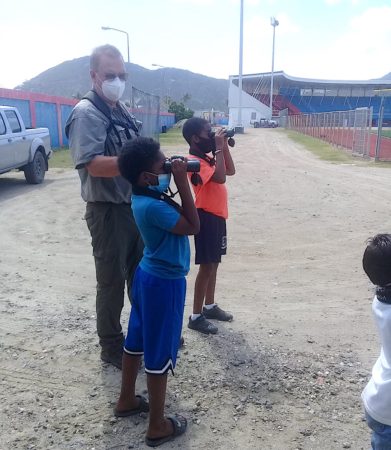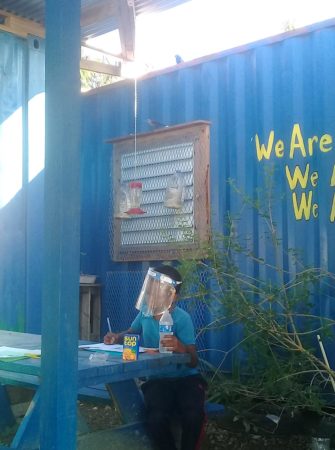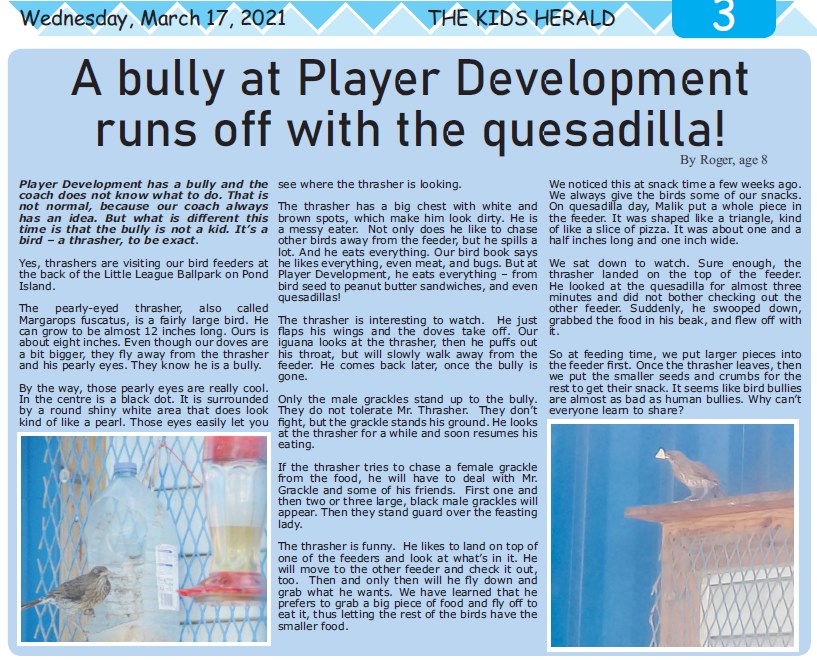
Binkie van Es shares his experience of working with disadvantaged youth in Sint Maarten—introducing them to birds and science through the BirdSleuth Caribbean education program. Was he successful in getting kids interested in birds? Read on to find out!
In 2014 BirdsCaribbean provided me with training to their BirdSleuth Caribbean Education Program. The training venue for the 3-day workshop was in the beautiful Retreat Garden at the Bahamas National Trust in Nassau. I will never forget how I was introduced into a wonderful new world that will be with me the rest of my life. Birding has never been the same since that week.
From the very first training day I was hooked on the program. I enjoyed every aspect of it.
For those of you that are not familiar with BirdSleuth, it is a program geared to young people. It teaches the life cycle of birds, the challenges birds face, their importance for us, and human influences (both positive and negative) on birds. The goal is to reconnect children with nature – and birds.
The program is set up as a classroom curriculum, but is extremely easy to adapt to other settings. Separate sections can be taught outdoors and during daytime events. With a bit of creativity, “birdsleuthing” can take place off grid. Over the years, I have used BirdSleuth in different ways – whether it is training educators, or teaching children in class myself.
How is the BirdSleuth program received? This varies, depending on the group. The greatest challenge is to get it introduced into school curriculums. The teachers are willing, but school boards are not so keen. The best memories, and greatest successes, have been working with children directly.

In the summer of 2020, I started working with an afterschool program in Sint Maarten, called Player Development Foundation. This foundation had evolved from a sports activity/ baseball little league to after-school experience-based education. The ages of the children range from 6 – 14 years; they come from difficult backgrounds, many with broken families and living in poverty.
I started visiting them one afternoon per week to teach them about birds. Using BirdSleuth Caribbean, they learn about nature, how to help keep our environment healthy, and how they can learn from bird behavior.
In the first lesson I introduced myself and started talking with them about birds, to find out what they already knew. Importantly, I made them realize that they knew more than they thought they did.
Over the course of several weeks, I taught these children how to use binoculars. They got to see birds close up for the first time in their lives and they were mesmerized.
We also made their location more bird-friendly, installing bird feeders (including feeders the kids made themselves), and attracting an ever-growing variety of birds into their outdoor classroom. Now, they get to see Bananaquits, Black-Faced Grassquits, Bullfinches, Carib Grackles, Pearly-Eyed Thrashers, and Zenaida Doves on a daily basis.
Then the community where they all live became a COVID hotspot, and their coach advised me to stay away until the risk was manageable again. They had to shut down twice for a fortnight because of exposure to the virus.
Nevertheless, the children had become thoroughly hooked on bird watching by that time. They continued to observe the feeders and study the bird’s behavior. Whenever they spotted a bird that they could not name, they would send me a picture for identification. On a weekly basis, the coach would post pictures of their bird adventures on Facebook.
Then the most amazing thing happened. The children were asked by the local newspaper if they were willing to write about the birds in their classroom, and willing they were!!!

So far, they have published three newspaper articles. Each story covers one bird species—the first one was on Bananaquits, the second on Carib Grackles, and third about Pearly-Eyed Thrashers.
The children are amazing. They observe carefully and they work hard on their research, although they only have access to one laptop with internet access. They observed, for example, the pecking order between the various species and between male and female birds.
I must admit that the children are better story tellers than I am, and the only help they got from their teacher was with grammar.
If you work with children or are planning to work with them, please consider the BirdSleuth Caribbean program if you are not using it already. It will open up a wonderful new world for you also.
A week after writing this blog post, I will be fully vaccinated against COVID-19 and am already planning my return to the children, who in turn, are also excited to hear that I am coming back to them to continue their bird education.
I extend gratitude to the Cornell Lab of Ornithology for developing BirdSleuth and would like to thank BirdsCaribbean for adapting the program for the Caribbean, for introducing me to it and providing all the teaching materials and binoculars. I appreciate all the children and adults who have so far been willing to be taught by me. Most of all, I extend my appreciation to Lisa Sorensen at BirdsCaribbean, who kept me motivated with her boundless energy, and who gave me this new, very rewarding, purpose in life.
By Cornelis “Binkie” van Es is retired from his career in sales and now working full-time on his second “career” as a bird educator, volunteer for several environmental non-profits, and bird tour guide on Sint Maarten/ St. Martin. He is a certified Bird Guide with BirdsCaribbean’s Caribbean Birding Trail program. Do visit this wonderful island – you’ll have the best time birding with Binkie!
BirdsCaribbean thanks the US Fish and Wildlife Service, NMBCA (Neotropical Migratory Bird Conservation Act) Program, and our members and generous donors for funding support for our BirdSleuth Caribbean program. We also thank Jennifer Fee and the Cornell Lab of Ornithology for their partnership and assistance.
Enjoy the gallery below – click on each image to see it larger and read the captions. And note: BirdSleuth Caribbean materials are available in English, Spanish and French for free download on our website. Contact Lisa Sorenson (email: Lisa.Sorenson@BirdsCaribbean.org) if you would like hard copies of the curriculum materials.








